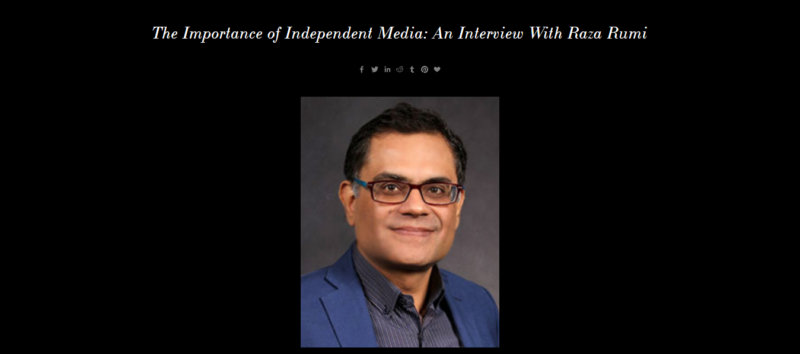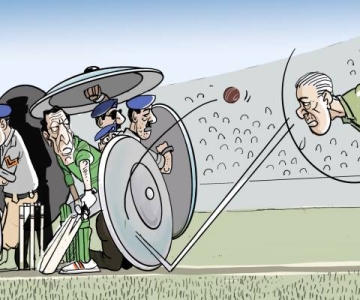Raza Rumi is a Pakistani journalist, author, and policy analyst. He serves as the Director of the Park Center for Independent Media at Ithaca College. He also a faculty member at the Cornell Institute for Public Affairs. Rumi discusses the importance of independent media, his vision for the Park Center for Independent Media, and gives a call to action for students of color interested in independent media.
What is your background in journalism? What made you decide to pursue the field?
I’ve had many careers and in 2005, I started to write. There was this urge to write, engage with the world, and express myself. I used to an employee for the Asia Development Bank, which is an international development organization. So I started writing and chose my pen name, Raza Rumi. So for the next three years, I was writing regularly and set up my blog. I realized I had an audience and needed to do it more. I was affiliated with a magazine called the Friday Times in Pakistan. That’s where I was writing mainly but I also wrote in many other South Asian publications. Then in 2008, I took a sabbatical from my job and I said, “I’m going to just try this out.” So, I went back to my home country and became a features editor at the Friday Times. I also started writing news columns for newspapers in Pakistan and India, and sometimes even abroad. That’s what brought me to journalism and ever since then, I never looked back.
I still continue to write. I am associated with a national newspaper called The Daily Times in Pakistan and I am also a frequent guest in various television programs in Pakistan, in South Asia, and in the U.S.
What brought you to Ithaca College? What do you think is unique about this institution?
It is all accidental. There is a local community group here called Ithaca City of Asylum. They contacted me in 2015 and they wanted me to be a writer in residence for the community. They have an arrangement with Ithaca College where they suggest writers to come get a job. So I came in as a Scholar in Residence in the Honors Program, where I was meant to teach courses every semester. I started with a Honors course and with a course in the Journalism department. I taught Investigative Journalism and South Asia Studies. Then, I started regularly offering courses in the Journalism department. I taught for another semester as an Assistant Professor in the Journalism Department. In Spring 2017, I ended my affiliation with Ithaca College. I taught for another semester in the Journalism department as an Assistant Professor. I’ve been teaching at Cornell since 2016 also, the Cornell Institute for Public Affairs. So, in January, I started teaching at Cornell full-time with a full load. Then, this job came up and I applied for it. I got it and now I’m back at Ithaca College.
What is unique about Ithaca College? It’s that Ithaca College is not so small, unlike other liberal arts colleges. It’s a pretty big and diverse campus. It offers many interesting programs. It has some of the best faculty, from all across the nation. It’s what I think makes it unique and with a strong liberal arts focus. I would say it still needs to reduce the whiteness that you see here. Both in terms of the structures, in terms of the faculty, in terms of the students, and in terms of the Board. With the new President, some efforts have been made and I think it’s in the right direction. But certainly, if it’s a liberal arts place, it needs to be more diverse and it needs to be more inclusive and representative of the nation.
Why is independent media important? Why is it crucial for IC students to learn about independent media?
Independent media is absolutely important for three reasons. First, the mainstream media in the United States is funded and owned by corporations which have very strong and powerful corporate interests. They may not always reflect it in the editorial choices, but they certainly guide and lead the framing of the news and views. So, that is why generations in the United States since the 20th century and the Cold War have been indoctrinated by the mainstream media where the idea is not to fully inform the citizens but to shape and mold their opinion which ends up supporting the nationals security imperatives of the United States government. Whether it be wars, whether it be domestic policies, whether it be issues like poverty, health, education. “It manufactures consent,” to use Noam Chomsky’s phrase. It does not really inform. So, independent media challenges that and tries to change that.
The second reason why independent media is important is that independent media is far more diverse and has a clear-cut agenda to make sure that people of color, marginalized voices, and marginalized communities get an equal if not more air time. Many of the important national policies that the United States government have funneled for decades are challenged and confronted. That may include things like immigration, religious freedom, and even things like housing, and gentrification. You don’t get to hear that. You don’t know what happens to communities which are thrown out of an urban neighborhood to further poverty, while rich builders come and build high-rises and gentrify in certain areas. So, that’s the second reason.
The third important reason is the global dimension. The U.S. mainstream media, or the corporate media structures I would call them, they treat the globe from the lens of U.S. exceptionalism, which tries to tell the world that the United States is the best country in the world, the most powerful, their people are the most democratic and benign, and they have somehow a genuine right to tell others to do things. Independent media movements challenge that notion. They tell the U.S. government, “you are being exceptionalist. You are being hegemonic, the new empire, and do not treat other countries in that manner. Do not go in and start bombing places.” Because if you can remember in recent history, Afghanistan, Iran, Syria, Libya, and Yemen have been directly or indirectly been bombed by the United States funds, arms, and its defense industry. And, the New York Times does not really explore that. The Washington Post does not really challenge that. CNN does not really justify that.
So, we live in a globalized world. How can we have a globalist perspective when other countries are treated as less important and other human lives across the globe are treated as less than an American life? So that’s why when you have one American attacked abroad, there is a storm in the U.S. media. But, in the Iraq War, more than a million people have died. In Syria, half a million people have died. How many times do you read these stories here as if these people don’t matter?
Independent media tells the United States public that we are a part of a global community. Let’s engage in a fair, respectful, and equal manner with the rest of the world. Do not think of yourself as superior or exceptional. And this is very important with the younger generation, particularly the students. We have liberal arts focus here to prepare better citizens who are not only citizens of the United States. There is a lot of rhetoric about creating “global citizens.” What does that mean? How can you create a global citizen when the the so-called “global citizen under construction” does not even know about the globe other than the U.S. hegemonic discourses?
What is the legacy or change you want to leave at Ithaca College?
To be honest, I do not have these delusions of grandeur that as an immigrant, a person of color, a newbie at Ithaca College can actually shake up things or leave a legacy. But definitely, the U.S. has been good to me and has helped me in rebuilding and reshaping my life so I want to give it back. My legacy would be if every semester I am influencing or helping young and bright students to think differently, I would have achieved my goal. During my stay at Ithaca College, even if 10 students turn out to be change-makers, alternative thinkers, or critical thinkers, I would be a very pleased person.
With respect to the Park Center for Independent Media, I do want to leave a legacy where I feel like this Center is more integrated across disciplines and departments. It should not just be an offshoot of the journalism department. It should be a campus-wide effort, engaging different students, faculty, the community, and the outer world at large. That is what I am now trying to do, to open up the Center to the outside world and open up the students to the outside world.
Do you have any advice for students, particularly students of color, that want to pursue journalism and/or independent media?
Independent media allows for incorporation of activism into the journalistic frames. It does not shy away from saying, “hey, we are advocacy journalists. Hey, we think police brutality is wrong.” And when there is a racist man attacking a weaker person of color, there is no other side. It is pure violence and it must be confronted and condemned at once. And for that reason, the young persons of color need to be more engaged and consider independent media options. For that, we offer internships here at the Park Center for Independent Media, where a competitive program leads to placement of students in these outlets for a short period of time like a summer. They can also explore the courses we offer. And of course, there are many other ways that we can engage with them.



